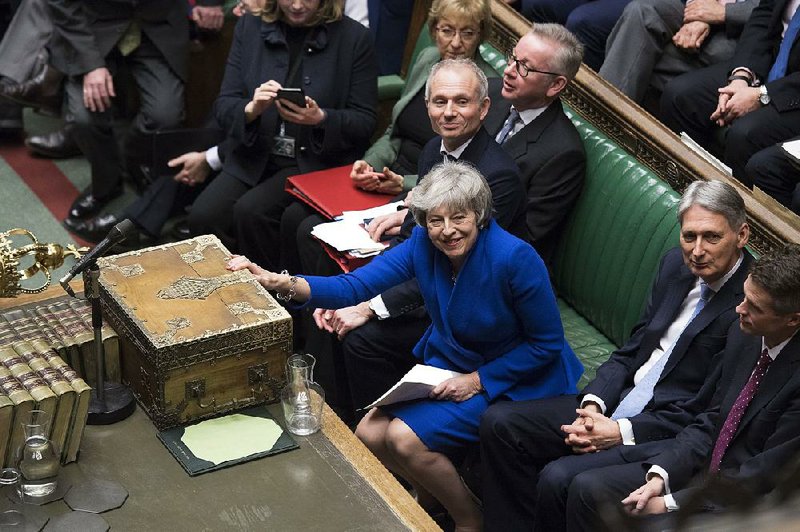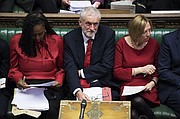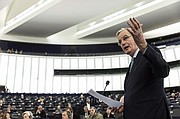LONDON -- British Prime Minister Theresa May survived a no-confidence vote in Parliament on Wednesday, a day after lawmakers rejected her European Union exit deal by a historic margin.
May won a narrow victory, 325-306, on an opposition motion seeking to topple her government and trigger a general election.
After the vote, May said she would hold talks "in a constructive spirit" with leaders of opposition parties and other lawmakers, starting immediately, in a bid to find a way forward for Britain's EU exit.
Legislators ripped up May's blueprint Tuesday by rejecting the agreement she has negotiated with the EU over the past two years. The vote was 432-202, making it the biggest government defeat in British parliamentary history.
Jeremy Corbyn, leader of the opposition Labor Party, responded with the no-confidence motion and urged the government to "do the right thing and resign."
Corbyn set the tone for Wednesday's debate when he said May was running "a zombie government," raising the specter of the undead prime minister repeating over and over again that "Brexit means Brexit" while devouring the brains of her party.
May, who leads a fractious government, a divided Parliament and a gridlocked EU-withdrawal process, said she was staying put. May said an election "would deepen division when we need unity, it would bring chaos when we need certainty, and it would bring delay when we need to move forward."
The government survived Wednesday's vote with support from May's Conservative Party and its Northern Irish ally, the Democratic Unionist Party. Many Conservatives who support the EU exit but voted against May's deal chose to back her in the no-confidence vote to avoid an election that could have taken a left-wing Labor government to power.
Had May lost the no-confidence vote, Britain would have faced a snap election within weeks, just before the country is to leave the European Union on March 29.
The prime minister now has until Monday to come up with a new plan for leaving the bloc.
May promised to speak to lawmakers from across the political spectrum. But she also said any new plan must "deliver on the referendum result," which May has long interpreted to mean ending the free movement of workers to Britain from the EU and leaving the EU's single market and customs union.
Many lawmakers think a softer departure that retained single-market or customs-union membership is the only plan capable of winning a majority in Parliament. They fear the alternative is an abrupt "no-deal" withdrawal from the bloc, which businesses and economists fear would cause turmoil.
Labor lawmaker Ben Bradshaw accused May of being "in a total state of denial" about how radically her plan needed to change.
Green Party legislator Caroline Lucas said May's intransigence had led to the current crisis.
"This is a national calamity of the prime minister's own making," Lucas said. "Today has to be the day when we start to change the conversation about Brexit."
Vince Cable, the leader of the Liberal Democrats party, applauded May's offer of cross-party talks. But he warned the prime minister that she should not "even lift up the phone" unless she is willing to rule out a no-deal departure, which she has not done.
Cable also said he wanted to have a "constructive conversation" about the possibility of a second referendum, which he endorses. May said again Wednesday that she would not support a second vote.
As the dispute drags on, lawmakers from all parties are trying to wrest control of the process so Parliament can direct planning for Britain's departure.
But with no clear majority in Parliament for any single alternative, European leaders expressed a growing sense that the March 29 deadline might need to be postponed, if only to give both sides extra time to prepare for the turbulence that would result from having no safety net of a negotiated transition plan.
EU LEADERS WAITING
European leaders are now preparing for the worst, although German Chancellor Angela Merkel said there was still time for further talks. She told reporters in Berlin that "we are now waiting to see what the British prime minister proposes."
But her measured remarks contrasted with the blunt message from French President Emmanuel Macron, who told Britons to "figure it out yourselves." He said Britain needed to get realistic about what was possible.
"Good luck to the representatives of the nation who have to implement something that doesn't exist," Macron said.
European policymakers gave little ground on their insistence that any withdrawal deal adhere broadly to the principles of the one that was rejected in Britain's House of Commons.
They said that the onus was on British lawmakers to come up with a proposal -- any proposal -- that could win a majority at home, providing a basis for continued talks between the sides.
In Brussels, diplomats said the scale of the defeat suggested that May had fundamental political problems with the process that went beyond any individual policy inside the deal, meaning they could do little to influence the discussion from outside.
The vote was a "crystal clear" rejection of the withdrawal deal, the EU's chief negotiator in the exit talks, Michel Barnier, told the European Parliament on Wednesday.
"This vote is not a clear manifestation of a positive majority which would define a positive alternative to the proposal on the table today," Barnier said. "It's up to the British government to indicate how we ought to take things forward on March 29 toward an orderly withdrawal."
Barnier said the bloc was stepping up preparations for a disorderly no-deal exit after Parliament's actions left Europe "fearing more than ever that there is a risk" of a cliff-edge departure.
Economists warn that an abrupt break with the EU could batter the British economy and cause chaos at borders, ports and airports. Business groups have also expressed alarm at the prospect of a no-deal exit.
France's parliament Wednesday passed legislation allowing for emergency measures, including extra customs officers, to deal with a no-deal exit.
May's deal was doomed by deep opposition from both sides of the divide over the U.K.'s place in Europe. Pro-exit lawmakers say the deal will leave Britain bound indefinitely to EU rules, while pro-EU politicians favor an even closer economic relationship with the bloc.
The most contentious section was an insurance policy known as the "backstop," designed to prevent the reintroduction of border controls between the U.K.'s Northern Ireland and the Republic of Ireland, an EU member state. Assurances from EU leaders that the backstop is intended as a temporary measure of last resort failed to win over many British lawmakers.
Ireland has insisted on keeping the border open, and the British government has said it is a priority, even as lawmakers have objected to the steps to do so.
Irish Prime Minister Leo Varadkar said it is now up to opponents of the backstop "to come up with an alternative solution to honor their commitment to avoiding a hard border."
Varadkar said if May's government was willing to shift some of its "red lines" in negotiations -- such as leaving the customs union and EU single market -- then the position of EU negotiators would also change.
"The onus is on Westminster" to come up with solutions, Varadkar said.
Information for this article was contributed by Jill Lawless, Danica Kirka, Raf Casert, Frank Jordans, Sylvie Corbet and Pan Pylas of The Associated Press; and by Michael Birnbaum, Quentin Aries, William Booth and Karla Adam of The Washington Post.
A Section on 01/17/2019


